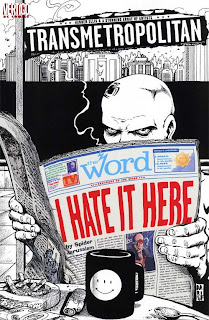I was reading Warren Ellis' Ignition City this afternoon. Good story, as is pretty typical with Ellis. The story, not surprisingly, mostly takes place in Ignition City which can probably be described as a shithole built largely with half-wrecked spaceships. Kind of like Mos Eisley, except where the Star Wars city might be described as far from the bright center of the universe, Ignition City really is the cesspool toilet that the universe crapped out, spit on and then decided to use as toxic waste dump.
A lot of Ellis' stories are set in dystopian societies of some sort. Ignition City just happened to have a decidedly more visible component to it. As is also fairly typical in a dystopian story (not just those from Ellis) most of the population just live within the confines of the dystopia, and try to make do as best as they can. It's usually only one person or a small handful people (usually the protagonists) who're able to affect change. Your Elijah Snow or Spider Jerusalem or whomever.
So I'm sitting here in southwest Ohio, pondering the nature of dystopias. Interesting thing about them: they're not really dystopias for everybody. If everybody were that bad off, people would be able to change things a little more readily. No, there's generally a small, elite group at the top of the food chain who are controlling some scarce resource(s) and living comfortably while forcing the rest of the population into some kind of dismal servitude. You look at 1984 or Fahrenheit 451 or THX 1138 or whatever, and there's a very clear, virtually insurmountable, separation between the vast majority of the population and the people at the top. Because they're able to control that resource, that gives them power to keep the other 99% of the general population oppressed.
Of course, most dystopian stories have a somewhat exaggerated locus of control. The ability to clamp down on all of the resources needed to have that level of control isn't functionally possible in this day and age, I don't think. At least not to the extent that we see in stories.
But they still exist after a fashion. Especially when you consider that one person's dystopia is another's luxury. This corner of Ohio is only just barely in the "Bible Belt" but I still find it far too religious for my tastes. (I pass a billboard on the way to work every day which posits the mind-blowingly absurd notion that Jesus was more responsible for my ability to read than my parents and all of my school teachers. Not to mention that I also live near the site of Touchdown Jesus -- built well after I moved here, by the way.) Not exactly "living in hell" for me since I can generally escape the torment from church-goers -- and Tea Partiers and bigots and the population of a district that always (and I mean, always) votes 180° opposite of me in each and every election regardless of the issue -- by holing up in my own home, but it's only a small island of respite. So you might call the overall area a dystopia for me.
But just like fictional dystopias don't exist in the same fashion in real life, there will not be a hero to come down and put things right. Because it's not just handful of people that are running things, but a larger group. One that can't be removed by one person, or even a group of them. It would take a significant population influx to change the area, and anyone who might want to live differently can just as easily go somewhere else that is more accepting of them instead of moving here.
Ultimately, dystopian fictions are like any other fictions in that they're an abstraction of reality. And while it might be easy to look at Doktor Sleepless and see parallels in the real world, they're not perfect analogies. Maybe it's not an problem that the rest of you have, but I'm enough of a cynic that I have to remind myself of exactly that from time to time.







0 comments:
Post a Comment